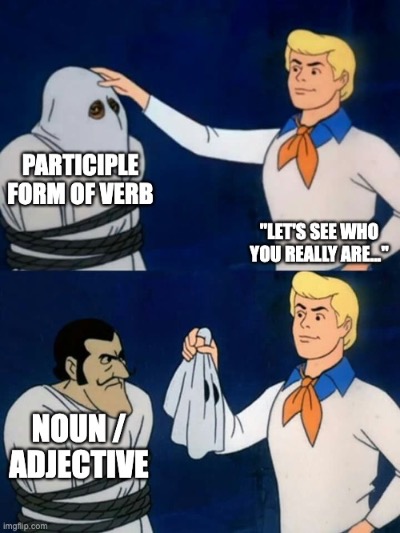Intro to Participles
Participles words that are made from verbs but act as a noun or adjective.

There are 3 types of participles.
- Root/Infinitive
- -ونکی - -oonkay suffix
- Past Participle
Root/Infinitive
This is the easiest to make. It's just the imperfective root, which is the infinitive or "dictionary form" of a verb. For example, for the verb لیکل - leekúl (to write), it's... لیکل - leekúl. That's right, it looks exactly the same, but when it's a participle it functions as a 3rd person plural noun in the sentence.
Here's an example where we use لیکل - leekúl to describe the activity or action of writing. And, as with all these kind of participles, it functions as a 3rd person plural noun.
These kinds of participles are used like the "-ing" present particple in English, or like the "to be" infinitives in English.
Inflecting the Root/Infinitive Participle
Just like with other nouns, these participles will inflect when:
- They're in a sandwich
- They're the subject of a past tense transitive verb
And just like with other plural nouns, they are inflected by adding an و - o on the end.
1. Inflecting in a sandwich
2. Inflecting as a subject of a past tense transitive verb
Since these particples are nouns, they can also be the subject of a sentance. For example:
ونکی - óonkay suffix
This type of participle is formed by adding ونکی - oonkay to the end of the short version of the imperfective root of a verb.
As an adjective
This form can be used to transform verbs into adjectives. For example, from the verb دردول - dardawul (to hurt, cause pain/sadness), we can add the ونکی - óonkay suffix and get the adjective دردونکی - dardawóonkay (sad/painful).
These "adjectives" will inflect just like any other adjectives ending with an unstressed ی - ay.
As an agent noun
This suffix can also be used to make verbs into agent nouns. This is like how in English we use "-er" or "-or" suffixes to make nouns like "worker", "player", "cutter", "gamer".
| Verb | Agent Noun |
|---|---|
زده کول zda kawul to learn | زده کوونکی zda kawóonkay student/learner |
ښوول xowul to teach | ښووونکی xowóonkay teacher |
لیدل leedul to see | لیدونکی leedóonkay viewer |
اورېدل awredul to hear | اورېدونکی awredoonkay listener |
Of course, these nouns will inflect just like any other nounse ending with an unstressed ی - ay.
Past Participle
They work as an adjective... EXPLANATION TO BE ADDED.